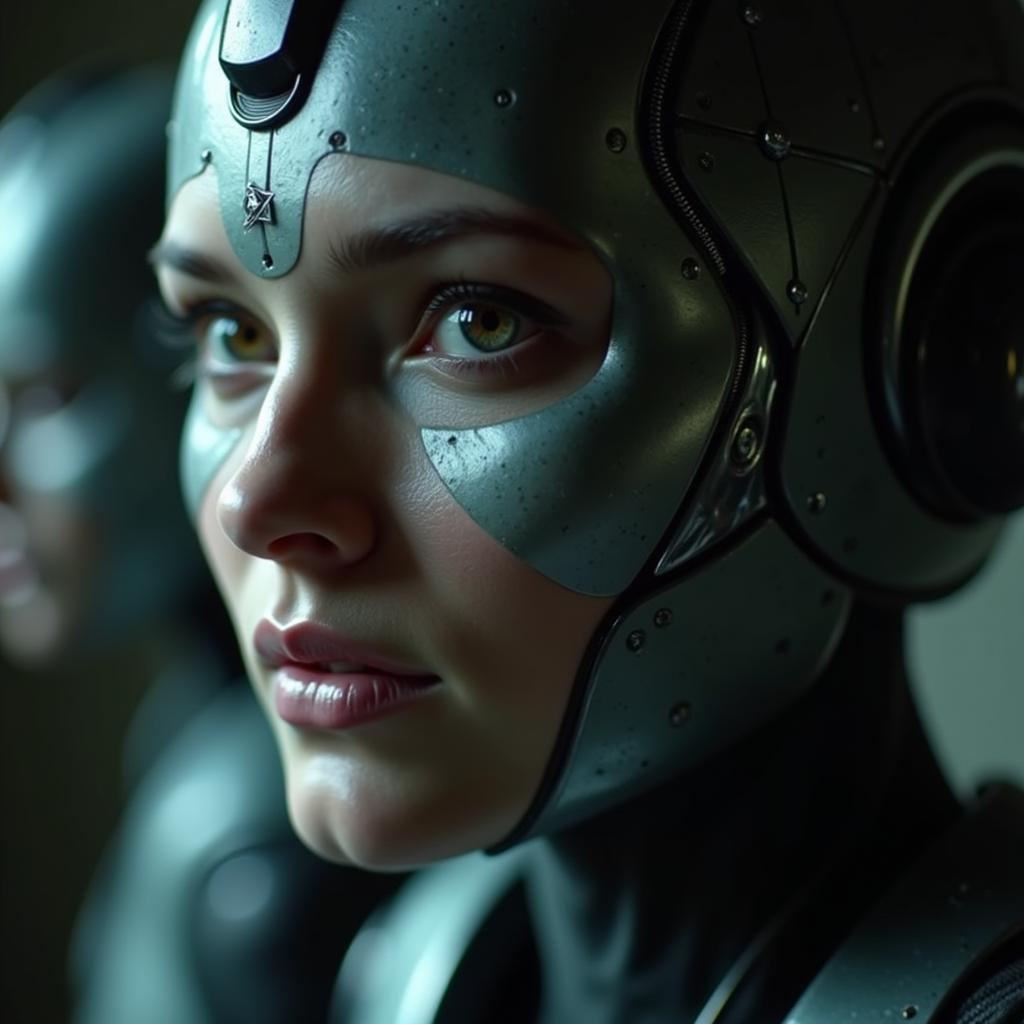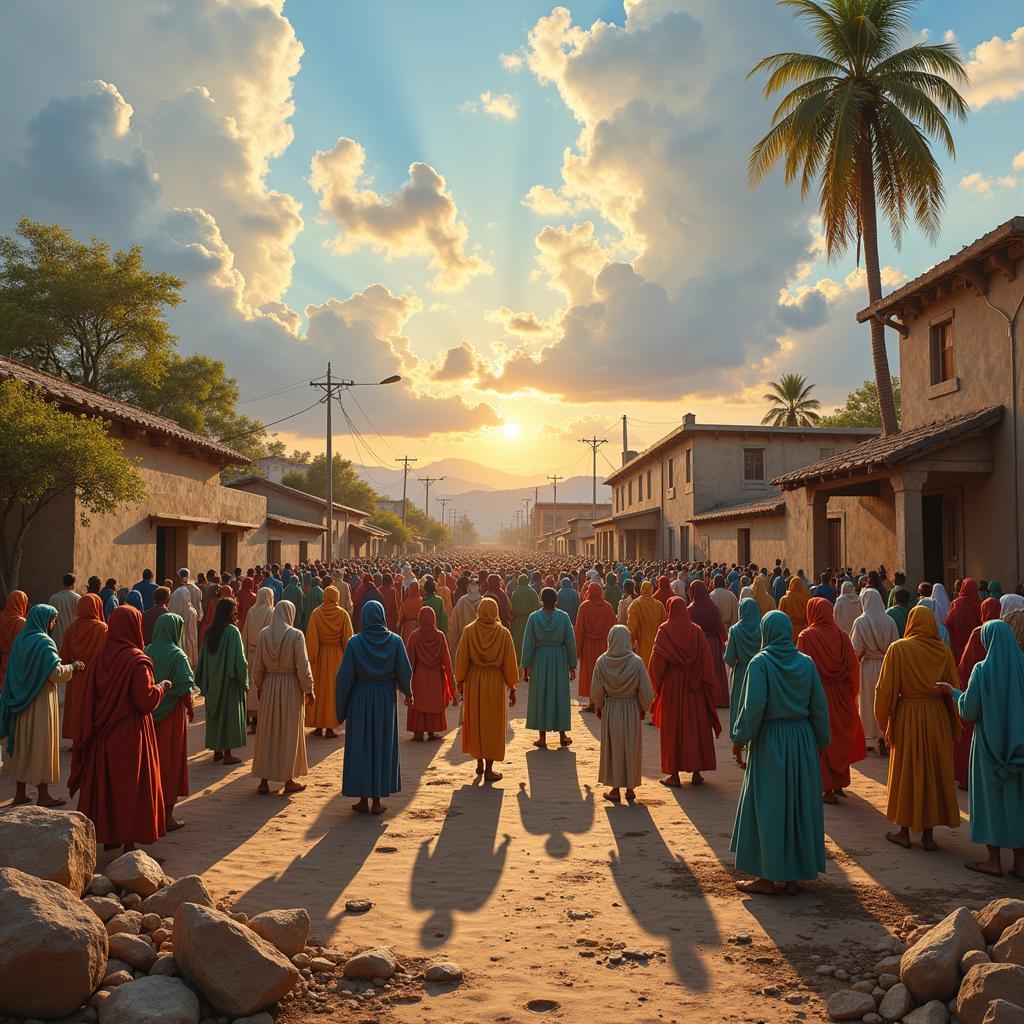Science fiction often serves as a mirror to society, reflecting its anxieties, aspirations, and flaws. Critiques Of American Society In Science Fiction are particularly prevalent, offering a unique lens through which to examine the nation’s cultural, political, and social landscape. These critiques, woven into imaginative narratives, provide powerful commentary on everything from consumerism and technological dependence to social inequality and political corruption.
Dystopian Visions: Reflecting American Fears
Many science fiction narratives present dystopian futures that extrapolate from current trends in American society. These cautionary tales often explore the potential consequences of unchecked capitalism, rampant consumerism, and the erosion of privacy in a technologically advanced world. For instance, works like “Fahrenheit 451” by Ray Bradbury critique censorship and the dangers of a society obsessed with instant gratification. Similarly, Suzanne Collins’ “The Hunger Games” series examines the stark realities of social inequality and the abuse of power in a dystopian America. These dystopian visions serve as stark warnings, prompting reflection on the potential pitfalls of current societal trajectories.
Technological Dependence and its Consequences
Science fiction frequently grapples with the implications of technological advancement on American society. From the pervasive surveillance in “1984” by George Orwell to the virtual realities depicted in “Ready Player One” by Ernest Cline, these narratives explore the potential for technology to both liberate and enslave. The increasing reliance on technology in American culture is often portrayed as a double-edged sword, offering convenience and connection while simultaneously fostering isolation and dependence. These stories often ask: at what point does our reliance on technology begin to erode our humanity?
The Blurring Lines Between Human and Machine
The anxieties surrounding artificial intelligence and the blurring lines between human and machine are recurring themes in science fiction. Stories like “Blade Runner” by Philip K. Dick explore the ethical implications of creating artificial beings and the challenges of defining what it means to be human in a technologically advanced world. These narratives reflect American society’s fascination with and fear of artificial intelligence, prompting discussions about the potential consequences of creating machines that may surpass human intelligence.
 Cyberpunk Android in Blade Runner
Cyberpunk Android in Blade Runner
Social Inequality and the Struggle for Justice
Science fiction often provides a platform for exploring issues of social inequality and the struggle for justice. Works like Octavia Butler’s “Parable of the Sower” depict a future America ravaged by social and economic collapse, highlighting the vulnerabilities of marginalized communities and the urgent need for systemic change. These narratives often challenge the status quo, offering alternative visions of a more just and equitable society.
The Power of Representation in Science Fiction
The increasing diversity within science fiction allows for more nuanced and powerful critiques of social injustice. Authors from marginalized communities are using the genre to tell their stories and challenge dominant narratives, offering fresh perspectives on the American experience. This shift towards greater representation is crucial in fostering a more inclusive and understanding society.
 Diverse Future Society in Parable of the Sower
Diverse Future Society in Parable of the Sower
Conclusion
Critiques of American society in science fiction offer valuable insights into the nation’s strengths and weaknesses. By exploring potential futures and extrapolating from current trends, these narratives encourage critical thinking and dialogue about the direction of American society. From technological dependence to social inequality, science fiction provides a powerful lens through which to examine the complex challenges facing the nation and to envision a more just and equitable future.
FAQ
- What are some common themes in science fiction critiques of American society?
- How does science fiction use dystopian settings to critique society?
- What are some examples of science fiction stories that explore technological dependence?
- How does science fiction address issues of social inequality and justice?
- Why is representation important in science fiction critiques of American society?
- How can science fiction inspire positive change in the real world?
- What are some key authors and works that offer insightful critiques of American society?
When you need support, please contact us by Phone: 02043854663, Email: [email protected] or visit our address: Khu 34, Bac Giang, 260000, Vietnam. We have a 24/7 customer support team.